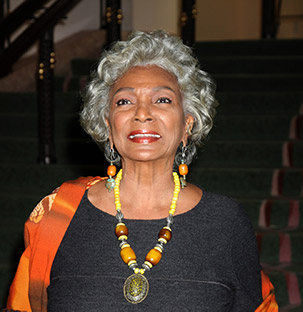'Star Trek' Star Nichelle Nichols Diagnosed with Dementia. Accusations of Senior Abuse.

According to reports, like so many aging Americans on the planet Earth, "Star Trek's" Nichelle Nichols has been diagnosed with dementia.
Her conservatorship documents obtained by the website TMZ say she has significant impairment in short-term memory and moderate impairment when it comes to abstract concepts, time, place, and recall.
In 2015, she suffered a mild stroke while at home. Often a stroke can lead to mild to progressive cognitive impairment. Dementia usually requires supervision and long-term care services and supports.
The 88-year-old was America's first black woman to star in a primetime show after being cast in 1966 as Nyota Uhura on Star Trek. Media reports say she was diagnosed with dementia officially in 2018.
Now legal papers file with the Los Angeles district of the Superior Court of California describe allegations of sustained elder abuse.
 Nichols began her show business career at age 16 as a singer with Duke Ellington in a ballet she created for one of his compositions and later sang with his band. After switching to acting, she was nominated twice for the Sarah Siddons Award for best actress in "The Blacks" and "Kicks and Company." Her film debut found her dancing with Sammy Davis Jr. in Porgy and Bess (1959). A guest appearance on The Lieutenant (1963) led to an offer from Gene Roddenberry to join the cast of Star Trek (1966). Her best-known role on the series is communications officer Lieutenant Nyota Uhura. She later repeated her role in a string of successful Star Trek films.
Nichols began her show business career at age 16 as a singer with Duke Ellington in a ballet she created for one of his compositions and later sang with his band. After switching to acting, she was nominated twice for the Sarah Siddons Award for best actress in "The Blacks" and "Kicks and Company." Her film debut found her dancing with Sammy Davis Jr. in Porgy and Bess (1959). A guest appearance on The Lieutenant (1963) led to an offer from Gene Roddenberry to join the cast of Star Trek (1966). Her best-known role on the series is communications officer Lieutenant Nyota Uhura. She later repeated her role in a string of successful Star Trek films.
Sustained Elder Abuse
Her former manager Gilbert Bell, who spent about a decade living in a guest house on her Woodland Hills, California, is being accused of exploiting her. Her son, Kyle Johnson, has filed for conservatorship of his mother because her health has made her a prime target for senior exploitation.
Unfortunately, those living with dementia are at a higher risk of financial exploitation since it is easier for family members, close friends, caregivers, and even financial advisors to manipulate them or trick them into giving up assets and other valuables. Many of these people are paying for care out of savings or have friends or family provide caregiving services.
Health insurance, including Medicare and supplements, will not pay for most long-term health care. Medicaid will pay for long-term care services but only if the person has little or no income or assets. Long-Term Care Insurance will also pay for care, but you must purchase a policy when you are younger and enjoy reasonably good health.
Dementia - A Huge Worldwide Problem
Worldwide, around 50 million people have dementia. Every year, there are nearly 10 million new cases. In the United States, one in three seniors dies with some form of dementia or Alzheimer’s, according to the Alzheimer’s Association. This is more than both breast cancer and prostate cancer combined. The result is billions in caregiving costs and impact on families and their assets.
People require long-term care due to illness, accidents, or the impact of aging. Planning in advance with affordable Long-Term Care Insurance will safeguard your savings and reduce the burdens that are otherwise placed on family members as you grow older. Your loved ones will have the time to be family instead of caregivers.
The cost of long-term care services gets more expensive yearly and varies depending on the type of care required and where you live, according to the LTC NEWS Cost of Care Calculator - Resources for Long-Term Care Planning | LTC News.
There are several types of affordable options available - Are All Long-Term Care Insurance Policies the Same? | LTC News. Premiums are based, in part, on your age when you obtain coverage, the total amount of benefits being purchased, your health, family history, and other factors. However, affordable options are available if you get coverage in your 40s or 50s - How Much is Long-Term Care Insurance? | LTC News.


